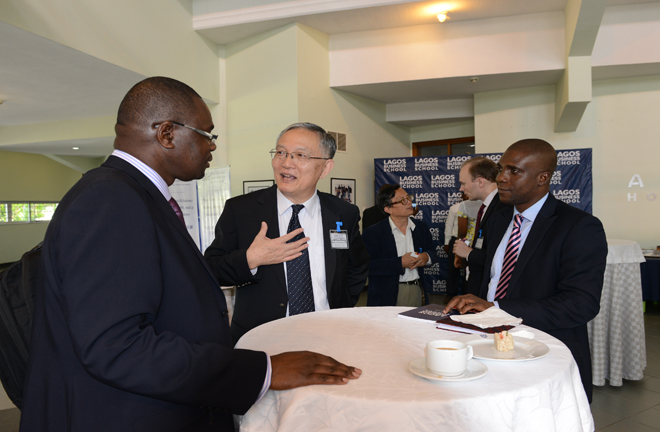Diplomat clarifies misconceptions about aid to Africa

The Special Representative of Chinese Government on African Affairs Zhong Jianhua (2nd left) talks with foreign scholars.
LAGOS—At a recent international symposium, the Special Representative of the Chinese Government on African Affairs elaborated on the purposes of the $60 billion aid package that China offered Africa for bilateral economic cooperation last year.
“The $60 billion for China-Africa economic cooperation proposed at the Johannesburg Summit of the Forum on China-Africa Cooperation (FOCAC) has been misinterpreted and misunderstood to varying degrees at home and abroad,” said Ambassador Zhong Jianhua at the symposium on “China-Africa Relations: Balance, Development and Sustainable Future,” which concluded on March 17 in Lagos, the capital of Nigeria.
In his guest speech for the event, Zhong first elaborated on the great significance of the FOCAC Johannesburg Summit to the development of China-Africa ties and then explained the goals of the $60 billion investment.
Zhong noted that the investment is intended to promote, strengthen and deepen economic cooperation between China and Africa. Since it is about economic cooperation, donation and charitable aid account for a very small portion. The money is mainly used as a form of investment and preferential lending to Africa. Investment and lending are both meant to generate returns, he said.
“Obviously, the economic collaboration between China and Africa is based upon mutual benefit. We respect the will of African countries and take their appeal into full consideration, bearing in mind the aim of achieving mutually and multilaterally beneficial results,” Zhong said.
He added that China is willing to promote China-Africa economic cooperation with the large sum of money because it is confident in Africa’s prospects and the future of China-Africa relations. “We have tied the fates of China and Africa closely,” he said.
In his speech “China-Africa Relations: Practice, Cognition and Prospects,” Li Anshan, one of the co-chairs of the symposium and director of the Center for African Studies at Peking University, stressed a few universally acknowledged facts about the China-Africa relationship.
Li said the relationship between China and Africa has developed quickly. China has offered a choice to Africa, and what China has done in Africa has facilitated international investment, Li said. He added that Europeans revered the two civilizations first and later subjugated them. Foreign powers carved up China and Africa almost at the same time. Today, the two sides both belong to the developing world and are striving to improve people’s quality of life.
With regard to problems in China-Africa relations, he said, “The more problems, the better, because there will be no problems if there are no exchanges. The deeper exchanges are, the more problems will arise. The important thing is that the two sides can ‘sit down’ on equal terms to find a way out. Every time a problem is solved, bilateral ties will go one step further.”
Ibrahim Gambari, the other co-chair of the symposium and former minister of External Affairs of Nigeria, themed his speech “China-Africa Relations amid Development: Opportunities, Challenges and Prospects.”
After reviewing the history of the warming relations between China and Africa under the guidelines put forth at the Bandung Conference in 1955, Gambari emphasized the similarity between China and Nigeria and between China and Africa, expressing his hope that bilateral cooperation will be mutually beneficial and give developing countries a greater voice in international affairs.
The two-day symposium was jointly organized by Yale University and the Lagos Business School. More than 90 scholars from Africa, China, the United States, the United Kingdom and France attended the event.
Long Yuan is a reporter at the Chinese Social Sciences Today.

 PRINT
PRINT CLOSE
CLOSE